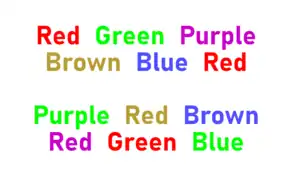Stroop effect
English

Naming the displayed color of a printed word is an easier and quicker task if the word matches the color (top) than if it does not (bottom).
Etymology
After John Ridley Stroop, who first published the effect in English in 1935.
Noun
Stroop effect (plural Stroop effects)
- (psychology) The effect that a subject has a longer reaction time when naming the colours of words if the words describe colours other than their own (such as "red" printed in blue ink).
Related terms
This article is issued from Wiktionary. The text is licensed under Creative Commons - Attribution - Sharealike. Additional terms may apply for the media files.